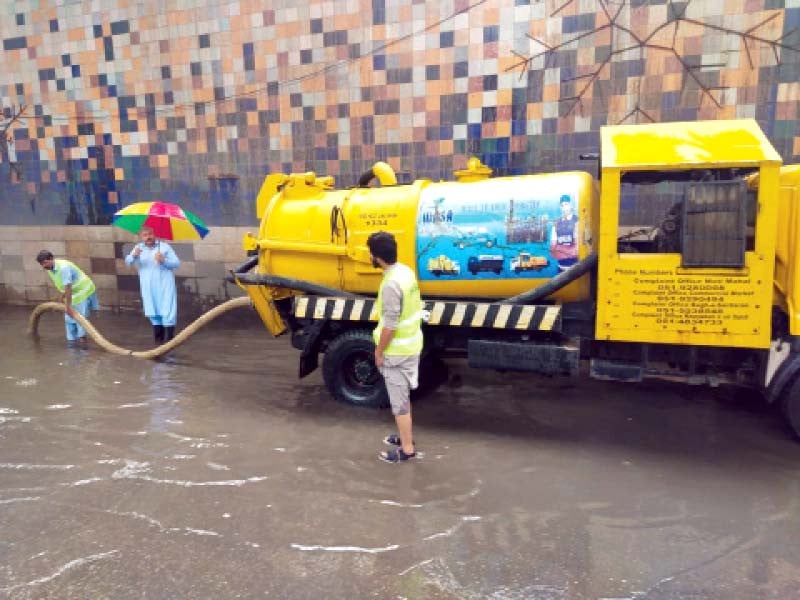
The Water and Sanitation Agency (Wasa) on Saturday resolved to launch a massive crackdown against defaulters. A senior special magistrate issued arrest warrants for four defaulters. Per the Wasa’s advisory, defaulters could avoid arrests, sealing of properties and water and sewerage disconnections by paying their dues.
The agency has decided to speed up the recovery operation against the defaulters under the direct supervision of Rawalpindi Development Authority Director-General Kinza Murtaza and Wasa Managing Director Muhammad Salim Ashraf. In this regard, a special meeting was held that was attended by the Director of Revenue, the Deputy Director of Revenue and other officers.
Addressing the meeting, the Wasa MD said that the agency used to meet all expenses from its resources so no shortcoming in revenue recovery would be tolerated. He gave a special ultimatum to the officers for a 100% recovery of arrears from all defaulters and ordered the revenue officers to disconnect the defaulter’s connections immediately.
Ashraf said that the defaulters were being given the last chance till May 31 to clear their arrears and after that late fees and instalments would be banned in the Wasa bills. He also hinted at property sealings, arrests and water and sewerage shutdown against the defaulters. The MD vowed that the crackdown would continue till recovery from the last defaulter.
A senior special magistrate, presenting a report during the meeting, said that the arrest warrants had been issued for Abdul Qayyum, Muhammad Anwar, Muhammad Parvez Abbasi and Muhammad Qasim Abbasi of Gilani Group of Hostels, who were declared defaulters.
‘Solar net metering policy needs revamp’
Experts say at a roundtable discussion related to recent talks about solar power policy
Experts on power and environmental policy gathered at a roundtable to discuss the solar net metering challenge in light of talks to overhaul the existing net metering policy.
Policy researchers and advisors, at the discussion organised by the Sustainable Development Policy Institute (SDPI) and Energy Update demanded a holistic revamp of existing policy as an urgent measure for promoting solar energy as a cheapest power resource amid growing energy demand.
In his opening remarks, SDPI Executive Director, Dr Abid Qaiyum Suleri, said that despite the government’s repeated assurances of no taxation on solar panels and reversing net metering formula, it is pertinent to work out research-based solutions to the problem that had stirred debate among the quarters concerned.
“The policy reversal scenario in the energy sector is not new as the nation witnessed such transition while shifting from diesel-based vehicles to those running on CNG fuel,” he said.
The fact of the matter is that due to technology transformation solar panels were becoming affordable and hence, this should further expedite solar energy roll out.
Research Fellow SDPI and energy expert, Dr Khalid Walid, discussed the dilemma of net metering in the country in consideration of Pakistan’s consumption mix, decreasing demand, increasing tariff and dirty grid, NEPRA’s own formula and Pakistan’s NDCs.
NEPRA Former Chairman, Touseef Farooqi said the flood gates have already opened and no one can stop the roll out of solar power technology. “It will be insane to limit solar energy roll out as it will not even benefit the national grid, whereas the fashion in which net metering is done should be probed for how it can best cater to the needs of the most deserving communities,” he said.
He added that the cheapest electricity, at Rs12.3 can be easily inducted into the system, but the government has been purchasing it at the rate of Rs23 per unit from the elite power producers, which is being paid by the poorest of the country.
He suggested that the electricity should be bought at the cheapest rate with net metering being promoted at the community scale through production of cheap electricity. “The masses should avoid misuse of net metering to avoid discrimination of poorer and contribute their share into the clean energy mix,” he said.
Dr Irfan Mirza emphasised that government decisions regarding the solar power sector should be guided by the policy recommendations of this forum.
"We need to reckon global trends in the solar power sector and understand the risk of events to overtake planning due to AI-based information era. However, there should be gradual indigenisation in adapting to solar power solutions,” he added.
Published in The Express Tribune, May 19th, 2024

1730965998-0/BeFunky-collage-(27)1730965998-0-405x300.webp)
1730965430-0/trump-(20)1730965430-0-165x106.webp)















COMMENTS
Comments are moderated and generally will be posted if they are on-topic and not abusive.
For more information, please see our Comments FAQ